
Mar 6, 2021 | Archives, Feature |
By Michael Levesque, Contributing Writer

Photo courtesy of Nancy Prentiss, Biology Class
The Natural History of a Maine Watershed class taught by Nancy Prentiss, accompanied by Maine aquatic professionals, ventured out to lay Atlantic salmon eggs near Avon, ME.
Classified as an endangered species, Atlantic Salmon are almost exclusively found in New England and waters north. These fish travel up rivers, like the Sandy, to lay their eggs and exit later to spend years of their lives out in the Atlantic Ocean. After their time in the ocean, they return to roughly the same area where they hatched from their eggs to lay eggs of their own and repeat the process.
Nancy Prentiss, the professor of the Natural History of a Maine Watershed class, has now made this trip three years in a row. She looks forward to this trip every year. “I’m definitely a field person,” Prentiss says, “I really pushed hard to submit a form for approval.” Luckily for the class, approval was given. They were able to utilize the class’ small number of students and independent travel to help make sure that everyone involved stayed safe.
Joining Prentiss and eight members of the class were the Department of Marine Resources, the Atlantic Salmon Federation and the National Marine Fisheries Service. Previously, the class prepared for the trip by practicing using snowshoes the week before. Despite frigid weather, COVID-19, and having to trudge through snow on snowshoes, the class persevered.
After locating a spot to lay the eggs, a gravel nest was made–similar to that made by actual salmon–to help protect the eggs. A tool resembling a funnel was used to create the depression in the ground. This process was delayed as cold temperatures made some of their equipment freeze. Although there were delays, Prentiss and her class embraced the challenges. “This is science,” Prentiss said.
Describing the eggs as similar to “Orbeez”, Hope Norton mentions she wasn’t expecting a class trip like this involving professionals to happen. The eggs were previously fertilized three months before. As eggs and young fish, they will call that nest home for approximately two years before making their own journey to the ocean. “I just love throwing students into a situation and then you learn by doing,” Prentiss says. “When [the students] are doing it themselves, that’s the best way to learn.”
Lauren Preis, a student in the class, described the struggles these salmon face today. “They have trouble migrating because of dams and culverts,” said Preis. “For every 15,000 eggs, only one adult salmon fish will return,” Preis says. Because of these grim statistics, blockages are a problem for the Sandy River and for other places and species as well.
Although these rates are alarming and frustrating, some studies and efforts show these fish as possibly having a chance. “There are fish returning from the fertilized eggs they have planted,” Prentiss says. Efforts made by educational institutions like colleges and high schools in Maine as well as state and federal agencies have produced some hopeful results.
For the class, this was an experience that shaped their student experience while getting them outside of UMF. “It was an amazing life experience,” Preis said.
Preis and her classmates perhaps didn’t imagine taking such a trip in the beginning of the semester, but are grateful nonetheless. “I wish I could do it with everybody,” Prentiss said. “We are always in a different stream and every time I go, I learn more.”
Prentiss is hopeful her class will be able to continue this tradition and have more people down the road lay salmon eggs. The shared goal of this class and others in the industry is to remove these fish from the endangered species list.
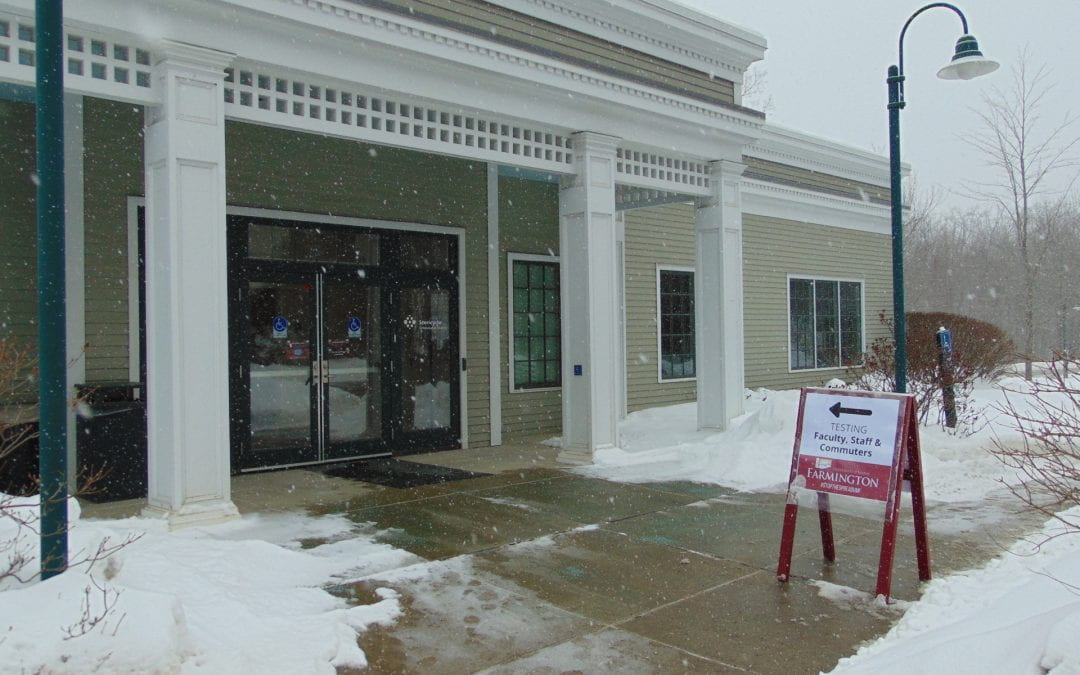
Feb 18, 2021 | Archives, News |
By Paige Lilly, Contributing Writer
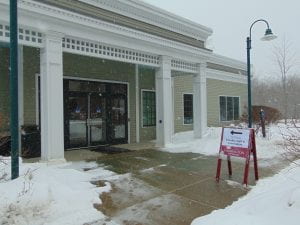
274 Front St. by Sam Shirley
As the new semester begins, UMF has opened the doors of a new COVID-19 testing center intended for the testing of commuter students, faculty, and staff.
Residential students will continue to be tested in Dearborn Gymnasium, while others will be tested at the new center located at 274 Front St. The new testing center will continue to help with social distancing while testing, along with minimizing interactions between residential and commuter students. “You can only do so much [to minimize student interactions] in terms of classes, but I definitely think it’s going to make a huge difference in terms of people’s safety,” said Jessica Howe, the COVID-19 Testing Coordinator.
Howe believes that with the large volume of students being tested this semester, the new testing center will keep crowds down and allow for better social distancing than Dearborn Gymnasium would alone. “With too many people, you can’t social distance or make a proper line in [Dearborn Lobby],” Howe said.
During the fall semester, students, faculty, and staff were randomly selected to get tested in each phase of testing. However, according to an email sent out by Christine Wilson on behalf of the Asymptomatic Testing Team, all students, faculty, and staff who “live on campus, take or teach classes on campus, work on campus, or participate in student athletics” are required to be tested every week this semester in Phase 6 of UMF’s asymptomatic COVID-19 testing.
Getting the word out about that has been another challenge Howe and her team have been facing, but signage and frequent emails have been a factor in overcoming this challenge. “We’re encouraging people to set a time to be their designated testing time every week,” Howe said. “We want people to put it on their calendars and then go through and sign up with us.” This is not required, but Howe believes that it is a great way for people to remember to get tested every week.
Elena Guarino, a sophomore, is one of the students who has tested at the new testing center. “It was interesting because I had never been to that site on campus before so it was a little tricky trying to figure out where to go,” said Guarino. “There is only one entrance [into the parking lot of the building], which I didn’t realize, so I ended up missing it the first time I drove by.”
Troy Johnson, a junior, said he appreciated being able to see the same style of posters that would usually hang on the student center walls in the testing center. “I lived on campus for two years, so being in the student center was a daily occurrence for me,” Johnson said. “Now, I live off campus and because of [COVID-19], I don’t really go [to the student center] much.”
Howe is also excited about the potential that the testing center has for communication with commuter students. “I’ve been trying to hang posters up similar to what would be seen in the student center in order to connect with students in that way.” Her main goal is to keep students, faculty, and staff both safe and engaged in their testing experiences.

Feb 18, 2021 | Archives, Feature |
By Abby Pomerleau, Contributing Writer
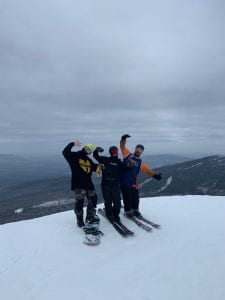
Left to Right: Simon Kern, Ryan Townsend and Sam
Scheff skiing and snowboarding at Sugarloaf Mountain.
Photo submitted by Abby Pomerleau.
The UMF Freeride team is making the most out of their season with weekly practices and optional competitions. The United States Collegiate Ski and Snowboard Association (USCSA) competitions are not being held this year, but the Freeride team is still enjoying the opportunity to ski. “Everyone on the team is still giving it their all and is continuing to push themselves because with or without competitions everyone just loves the sport in general,” said Bridget Stephenson, a sophomore who skis on the Freeride team.
Although there are no USCSA competitions, there are a few small competitions available to anyone and require a payment of $120. Some members of the team are planning on participating. “I’m really glad we have this opportunity to compete,” said Ryan Townsend, a junior who also skis on the Freeride team. “It gives us the ability to use the new skills we have been working on in a competitive setting.”
The Freeride team practices at Titcomb Mountain on Thursdays and Sugarloaf on Saturdays. The team also visits the Anti-Gravity Complex (AGC) next to Sugarloaf once a week to use their trampolines. This allows the team to work on new tricks before they try them on the slopes.
Being on a ski team provides the members with a COVID-safe social experience. “I really like to be around people with similar interests as I do,” said Townsend. “Everyone is really cool and very supportive.” By being on the Freeride team, it allows for its members to do what they love while meeting new people.
Regardless of the lack of regular competitions, ski season looks relatively normal to the Freeride team. “Everyone still gets to go skiing together and supports each other to try new things,” said Stephenson. “Everyone on the team is there to do what they love, so even if there wasn’t a team we would all be out there anyway. The lack of competition doesn’t stop us.”
Skiing isn’t just about the competitions for some of the team members. “Skiing has fully shaped my experience here at UMF,” said Townsend. “For me, being outdoors is a major part of my life and skiing contributes to that. Although we can’t regularly compete, skiing on this team is important to me and how I spend my time here at UMF.”
Like Townsend, many UMF students enjoy skiing as a hobby. Titcomb Mountain is roughly 5 minutes from campus, while Sugarloaf is roughly 55 minutes from campus. Having these mountains relatively close to UMF allows students to have the ability to ski when they please.
The Freeride team loves when newcomers join the team. “Everyone on the team is so welcoming and there are people on the team from all ski levels,” said Stephenson. “We have people who are completely new to park skiing and snowboarding, and people on the team who are nationally ranked, so there are plenty of people to seek advice from.”
To join the Freeride team, email the Snow Sports Director, Scott Hoisington, at james.hoisington@maine.edu.
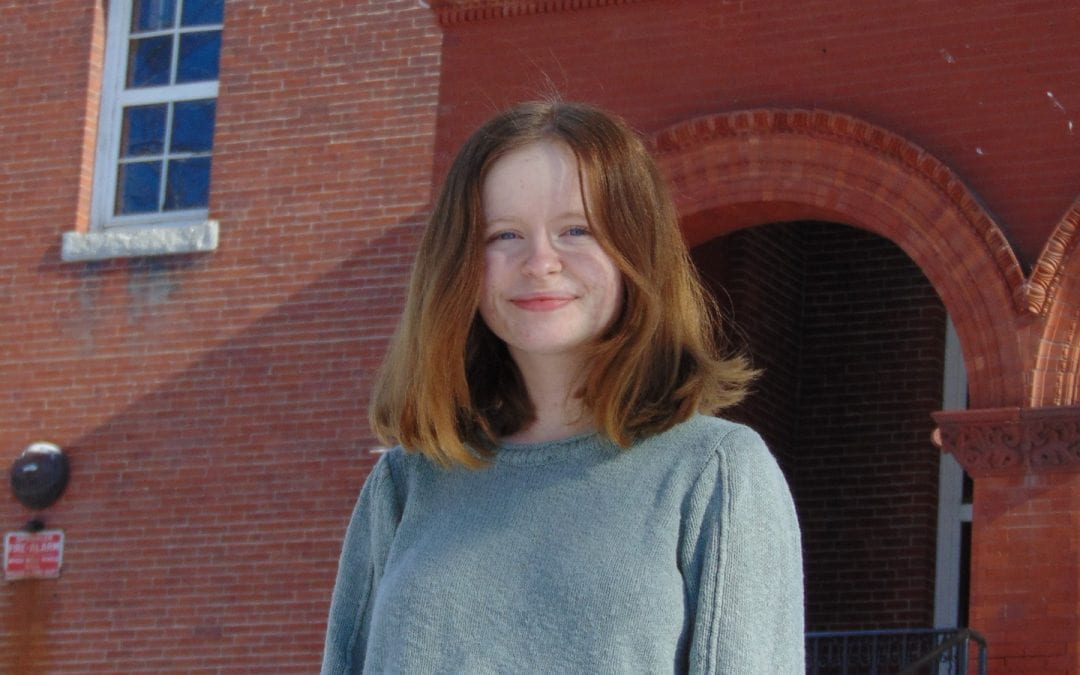
Feb 18, 2021 | Feature |
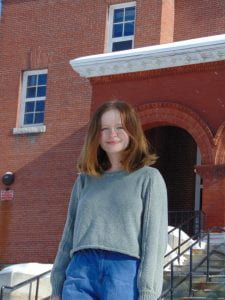
Clefnotes President Gacie Vaughn by Sam Shirley
By Samantha Pond, Contributing Writer
Two of UMF’s acapella groups, Deep Treble and the Clefnotes, are finding ways to continue making music despite the pandemic.
In March 2020, both groups were thrown for a loop when schools started to close down and no one was able to rehearse together. All plans for Deep Treble and the Clefnotes were brought to a halt, as singing in groups was not recommended by the Center for Disease Control (CDC).
Over the summer, both of UMF’s acapella groups worked online to plan for the fall semester. Working together was necessary for groups to stay positive. “We frequently Zoom to check in on each other and discuss future club plans,” said Gracie Vaughan, second-year student and the president of the Clefnotes.
Both groups on campus are not giving up on rehearsals and meetings during these challenging times. Third-year student and co-president of Deep Treble, Kaitlynn Tarbox, has shown great determination to help keep Deep Treble together. “We have still been meeting twice a week during the pandemic with heavily enforced COVID procedures to ensure everyone’s safety,” Tarbox said. “We have to keep 10 feet of distance between everyone while we sing and still be masked to follow CDC guidelines.”
Rehearsals for the Clefnotes are looking a little different than Deep Treble’s rehearsals. “We no longer have full group meetings and meet instead in smaller groups of less than six people,” Vaughan said. “While it has created some physical challenges, it has truly shown many of our members’ determination to keep Clefnotes fun.”
With constant changes in regulations, members not able to attend, and not being able to find spaces for each group to rehearse and perform as a whole, both groups have faced challenges. “It has been difficult to find performance opportunities that were not virtual,” said Tarbox. “It is very difficult to put together a virtual concert so in-person performances are preferred if we can.”
For the acapella group, Clefnotes have felt differing struggles as they continue rehearsals in small groups and on Zoom. “Additionally, the stress of the pandemic itself has only intensified the stress of being in college, as many of us are juggling jobs, clubs, and social lives,” said Vaughan.
Despite the hoops the Clefnotes and Deep Treble have had to jump through to be able to practice together, singing acapella has kept members optimistic about the rest of the semester. “We are remaining a positive, safe space…so that our members can have a break from academics and still be able to see each other,” Tarbox said. “All of our decisions are run by not only our [executive] board members, but by the group as well.”
Auditions have become a struggle for both groups, as there is no place for them to be held when taking into consideration the conflict of safety when doing so. “[Deep Treble] held auditions last semester and filled some of our available spots, but this semester, with COVID-19 getting worse, we decided to hold off on auditions until next fall,” said Tarbox. The Clefnotes accepted video submissions for their auditions. Those who have auditioned and qualified for callbacks will receive their callback confirmation via email by Feb. 12.
If students would like more information about either group on campus, please contact umf.deeptreble-group@maine.edu for information on Deep Treble or gracie.vaughan@maine.edu for Clefnotes or DM them on Instagram (@umfclefnotes).
Feb 18, 2021 | Feature |
by Maxen Ryder, Contributing Writer
The Nightmare Club provides a pleasantly scary experience for their group by hosting activities and events in order to create a positive, safe community.
Every week, members of the club vote on a horror movie to watch together. The end result is a group experience with the intent of community, fun, and, of course, scares. The Nightmare Club is enforcing the same COVID-19 guidelines the rest of the school follows with masks and social distancing. Additionally, students who plan on going to the weekly events confirm they will be participating in advance to the meeting. This way, the club is still safe in regards to the pandemic.
The club is a fun way to safely spend a night with friends and meet new people in Farmington’s thrilling night life. “Nightmare Club has always focused on being an environment where everyone is welcomed and just getting to know each other through our shared interest in horror and the supernatural,” said club President Abby Young.
While the movies are often scary, the atmosphere in the room is much more lighthearted. “The meetings are often filled with lighthearted jokes and commentary about the movies being watched and really provide students with an almost humorous break from the stresses of college,” said Young.
The Nightmare Club originated from Professor Paul Gies’ English class on H. P. Lovecraft. “It’s a club for nerds,” said Gies, the Nightmare Club’s faculty advisor. “In Lovecraft class, I think I turn non-nerds into nerds every year.”
Gies uses the term in a positive, light mannered way. “A nerd in modern terms is just someone who is not ashamed of how interesting they find some author, some genre, some art form, some series, some game series, some mythos,” said Gies in an email. “Lovecraft, who’s sort of my bailiwick, was sometimes a great writer, unmatched really, but at other times he was mediocre; we forgive him even as we smirk at how horrible the good guys are in “The Hound” or how wimpy Randolph Carter is.”
The Nightmare Club is always looking for new members to make their community even better. “We really just aim to have everyone feel safe and welcomed and encourage everyone, even if you don’t like the horror genre, give us a try because we try really hard to make sure everyone is safe and comfortable,” said Young.
Students interested in joining the Nightmare Club should email umf.nightmare-group@maine.edu before going to a meeting or join their public Facebook group, “UMF Nightmare Club.” They meet on Friday nights in Roberts 023 at 7:30p






